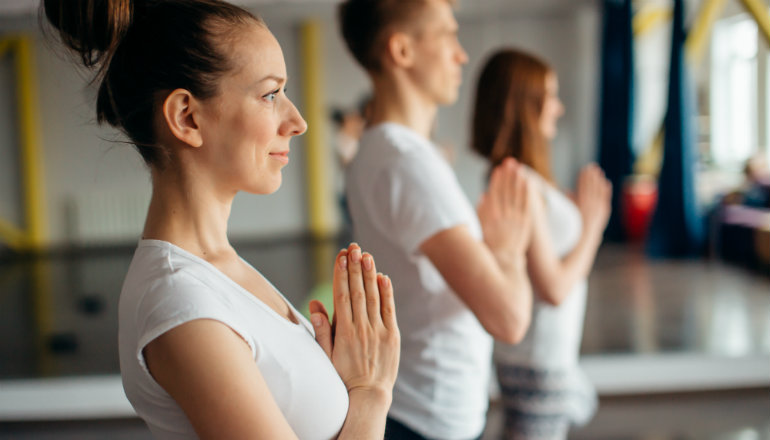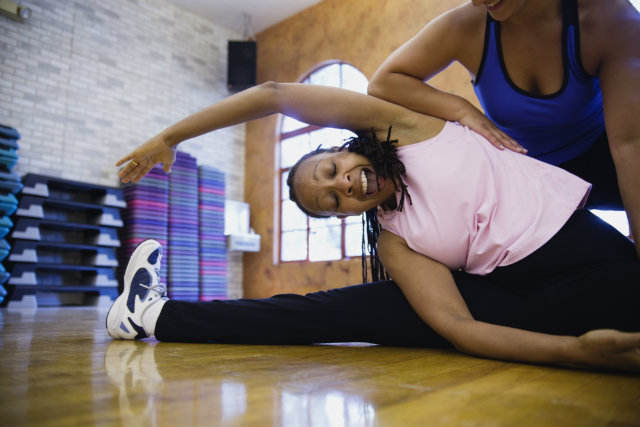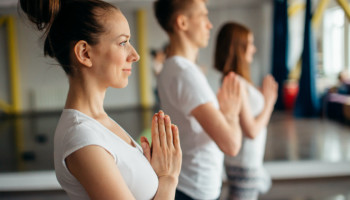 Reading Time: 7 minutes
Reading Time: 7 minutesThe picture of what health and well-being is seems so clear — exercise, eating right, good sleep, and, if you’re really dialed in, some stress relief. We’re all at least aware of this profile whether we’re fully engaged in it or simply pining for the time to get to it.
But what if I told you there was more to your health and well-being than just that?
Not only more, but something that you can do right where you are sitting and that will improve your experience of life wherever you are on the path.
At Whole Life Challenge, we call it the Well-Being Mindset. It’s an entirely different perspective, and it takes practice and training, just like health and fitness does.
What Is the Well-Being Mindset?
The Well-Being Mindset is an awareness that exists outside the realm of physical health or fitness. It is not a prerequisite for having health or fitness, but a perspective that allows you to experience yourself as “well” regardless of the physical state of your body, emotions, or environment.
Said another way: the Well-Being Mindset is about how you relate to yourself while you go through the inevitable ups and downs of life. The Well-Being Mindset doesn’t care if you lose ten pounds and it doesn’t judge you as “wrong” or “bad” for not having done so. In fact, it enables you to accept, love, and provide for yourself even if you gain ten pounds. It’s your partner wherever you are in your process and doesn’t make you wait for “results” for you to feel the way you want to feel.
This doesn’t mean you can eat candy all day and magically be healthy just because you have the “right” mindset. It means the way you see and experience the world doesn’t need to come from results. Rather, you develop an inner sense — of joy, gratitude, and acceptance — that you carry with you every day. And not only are these qualities as important to health as the food you eat, but if you possess them, you will instinctively treat yourself and your body as sacred.

In addition, the Well-Being Mindset can provide the calmness and clarity that allows you to evaluate your choices and discover what truly makes you feel healthy, happy, and alive. It helps you develop your intuition about your body and gives you a greater ability to make your choices in a way that feels powerful and true for you.
Because while there are people who have expertise in the human body and mind, they can only give you information. They cannot deliver health and fitness to you, and they certainly can’t do so instantaneously. What you eat, what medical treatments to seek, what exercise you do, and what makes you happy are choices that are ultimately yours alone to make.
Your results are your responsibility, and your results stem from the choices you make based on your mindset.
How Do We Cultivate a Well-Being Mindset in Our Lives?
The Whole Life Challenge is designed to assist you not only in improving your health and fitness, but also in developing the Well-Being Mindset. This process works on two levels:
The Physical Level of the Whole Life Challenge
The Whole Life Challenge is anchored in your physical health and fitness. These are the areas of your life where you take action each day, the first five of the 7 Daily Habits — Nutrition, Exercise, Mobility, Sleep, and Hydration. These are touchstones for developing a relationship with your body and becoming aware of how it works, how to change it, and how to listen to what it’s telling you.

One of the most powerful aspects of the Challenge is that you are in charge of the specifics of each of these areas. We provide guidelines for nutrition, but it is up to you to say what is “compliant” or “noncompliant” in your life (we suggest you follow our guidelines if you are new to the process). You get to define “exercise.” You get to say how you mobilize, how much sleep you’ll get, and how much water you’ll drink.
We encourage you to determine how and to what level you want to be held accountable in this process and what would be a challenge for you.
If you only focused on the physical during the Whole Life Challenge, you would likely get everything you came for — and, without even necessarily meaning to, go a long way in developing a Well-Being Mindset. Simply taking action and becoming responsible for your choices is a tremendous step in increasing a sense of peace and power in your own body.
But what makes the Whole Life Challenge unique is the specific and intentional work you will do in developing a Well-Being Mindset. There are two additional Habits on top of the five physical ones mentioned above: Well-Being Practices and Reflection. They are the second level at which the Challenge works.
The Mindset Level of the Whole Life Challenge
The Well-Being Practices are weekly “assignments” in actions that help develop the qualities of the Well-Being Mindset. What are the qualities of the Well-Being Mindset?
- Joy
- Peace of Mind
- Compassion
- Acceptance
- Gratitude
- Mindfulness
- Kindness
The Well-Being Practices provided during each Challenge are emblematic of the kind of practices that can develop these qualities in your life. These practices address areas of your life typically left out of health and fitness — technology, your relationships, the ways you talk to yourself, having fun, being of service, mindfulness, and many others. The Well-Being Practices are simple, easily trackable, and can give you a greater level of insight into areas of your life where these qualities might feel missing. They provide “stop and smell the roses” moments.

Engaging intentionally in the practices is key to developing a Well-Being Mindset. The secret is in becoming aware of the qualities of a Well-Being Mindset as opposed to just doing the exercises. For example, you might find joy, peace, or gratitude in a situation that typically has no meaning, like watching the kids around you laugh while waiting in the checkout line in the grocery store. You might experience acceptance in being able to forgive yourself for missing a few days at the gym. You can even drop into mindfulness while spending two hours prepping a week’s worth of food. Practice in cultivating these qualities makes them likely to show up more often and in places you don’t expect them.
The second Habit at this level is Reflection, or journaling, on your daily progress in developing your health, fitness, and the Well-Being Mindset. Reflection during the Challenge is a chance to remind yourself of victories, share your experience with others, correct your course, and look back on your day and notice where the qualities of the Well-Being Mindset are showing up in various areas of your life.
Outside of the game, Reflection means taking moments to look back on your actions, thoughts, and inner experiences to see more clearly how you relate to yourself while you go through life. Do you ever congratulate yourself? Do you judge yourself a lot? Do you do what you say you’re going to do? Can you acknowledge what you’re afraid of without making it wrong? All these insights offer you ways to shift how you are in the moment to give yourself a more fulfilling view of life.

The Well-Being Mindset Transforms Every Single Day
The simple things you do every day make up more than half of your daily actions. They hold the greatest opportunity for improving your experience. We often think those small things are mundane — tasks to get through to get to the stuff that will make life better.
But the small things are where life happens. If you can improve these things by altering your mindset, you can improve a lot of your life.
In developing the Well-Being Mindset, you transform vast areas of your life into ones full of joy and gratitude. You can:
- Experience your life as perfect
- Cease judging who you are by the things that do and don’t happen
- See your life from a place of Well-Being
- Accept yourself
- Be “enough”
- Experiencing peace and mindfulness
And, best of all, you get to have health as a function of these things, rather than having these things as a consequence of pursuing the “right” set of numbers on the page.
We may find out a hundred years from now that what we consider “healthy” today is simply decrepit from the standards of health then. Does that mean we are unhealthy now?
No, it simply means we get to declare “health” for ourselves, and the best way to do that is to move away from a mindset of “good,” “bad,” and “should,” and instead develop a mindset that supports acceptance, allows you to make choices that empower you, points you in the direction of what you love, and frees you to experience every moment of your life as a moment worth living.







